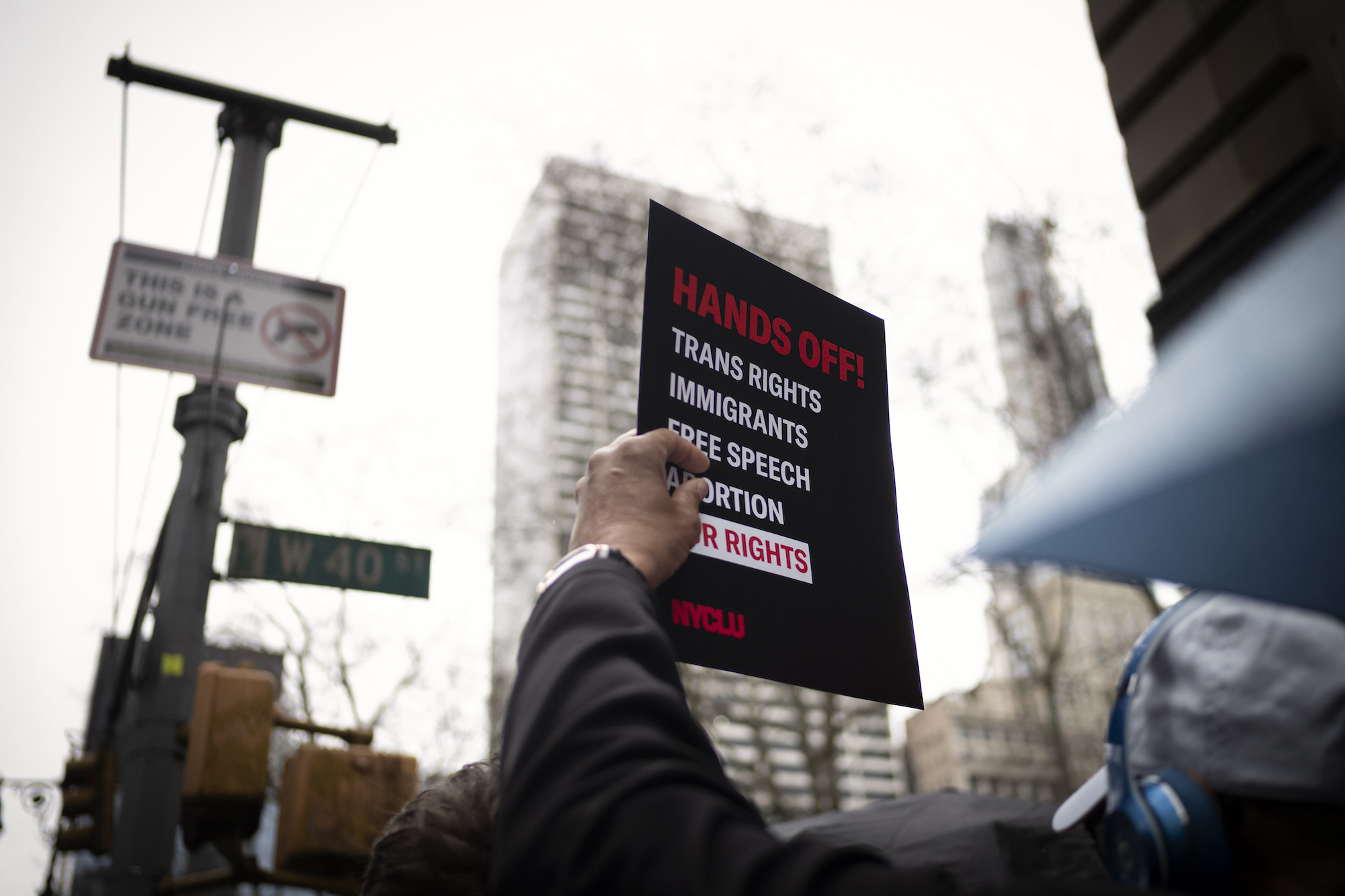Just 100 days into President Donald Trump’s second term, the ACLU has filed 51 cases against his administration. We sought emergency relief in 38 of these cases, winning at least some form of preliminary or temporary order in 27 cases. To our clients, these are not just numbers. Our work with them, and on their behalf, has made a real difference in their lives.
Courts Are Checking Unlawful Executive Action
From the start, litigation has been a tool of first resort in protecting people’s rights and freedom. On Inauguration Day, we filed our first case of the second Trump term, challenging his effort to dismantle the Fourteenth Amendment’s guarantee of birthright citizenship. We won a preliminary injunction before the unconstitutional order’s effective date.
We have also won multiple orders blocking Trump’s extraordinary invocation of the 1798 Alien Enemies Act, which gives presidents certain powers during wartime, to deport Venezuelan nationals to a gulag in El Salvador without due process. We’ve won preliminary relief from six federal district courts — in Washington, D.C., Texas, New York, Colorado, Pennsylvania, and Nevada — blocking deportations under the Alien Enemies Act, and have scored two victories on the Supreme Court’s emergency docket. First, on April 7, the Supreme Court ordered that individuals subjected to deportation under the Alien Enemies Act must be given notice and an opportunity to contest their designation in court. Then, at 12:45 a.m. on April 19, the court granted our emergency motion to temporarily block all deportations under the Alien Enemies Act from the Northern District of Texas pending further order of the court. We also won a preliminary injunction blocking Trump’s termination of Temporary Protected Status (TPS) for Venezuelans, affecting 600,000 people currently residing lawfully in the United States.
In four separate cases, we have protected four immigrants targeted for detention and deportation solely because of their First Amendment-protected speech. Mahmoud Khalil, a recent Columbia University graduate, was detained after leading peaceful protests in support of Palestinian human rights. Rümeysa Öztürk, a Tufts University doctoral student, was targeted for co-authoring an op-ed that criticized the university’s rejection of various student government resolutions concerning Israel’s military campaign in Gaza. Dr. Badar Khan Suri, a Georgetown University professor, was arrested due to his scholarship and advocacy on the Middle East, as well as his U.S.-citizen wife’s family ties to Gaza. And Mohsen Mahdawi, a Columbia University student and longtime lawful permanent resident, was arrested at his naturalization interview, also in retaliation for his advocacy for Palestinian rights. In all four cases, we won orders blocking the Trump administration from deporting our clients while litigation continues.

Credit: Scout Tufankjian
We have also filed ten cases challenging the Trump administration’s broader attacks on international students. The U.S. State Department terminated the electronic student visa records of hundreds of students at campuses around the country, without any due process. In the absence of any official reasons, Secretary of State Marco Rubio stated in a media interview that he revokes student visas “every day, every time I find one of these lunatics,” referring to his searches through students’ social media accounts for expressions of sympathy for Palestinians. But many of the affected students have never engaged in any form of protest, and there is no discernible reason for the termination of their records or visas. We have obtained preliminary relief in six of our ten pending cases so far. And on April 25, the government announced that it would undo the mass terminations and restore the affected records.
We have also scored significant victories in challenges to Trump’s heinous executive orders targeting transgender Americans: We blocked Trump’s attempt to enforce a nationwide ban on essential health care for transgender people under the age of 19, as well as his executive order requiring passports to indicate the holder’s sex assigned at birth rather than their actual gender identity.
And when Trump has tried to roll back on the hard-won gains of the Civil Rights Movement, we’ve blocked him there, too. We secured a preliminary injunction against his executive order requiring documentary proof of citizenship for voter registration, which usurped Congress’ constitutionally assigned role. We blocked the U.S. Department of Education’s “Dear Colleague” letter, which threatened to defund educational institutions over programming on forbidden topics such as diversity, equity, and inclusion (DEI), and subsequent guidance that would have required states, under threat of legal penalties, to certify that their schools weren’t teaching or supporting DEI programs.
Win or Lose, the Arc Bends Towards Justice
Despite these proofs of concept for the value of litigation, we must acknowledge the serious risk that the Trump administration may, in some cases, simply ignore its defeats in the courts and carry on with its unlawful actions. Although Trump has yet to openly defy a court order, he has already come dangerously close.
In our initial challenge against his use of the Alien Enemies Act, J.G.G. v. Trump, the Trump administration failed to follow the district court’s order that any planes in the air should turn around pursuant to its temporary restraining order. And in the case of Kilmar Abrego Garcia (not an ACLU case), a Maryland man who was deported to a notorious Salvadoran prison, CECOT, despite having an order of humanitarian protection from a U.S. immigration court prohibiting his deportation to El Salvador, the Trump administration has failed to bring him back even after the Supreme Court ordered it to facilitate his return. In these cases, U.S. Justice Department lawyers are still raising legal arguments in the courts, claiming essentially that the courts have exceeded their powers and that the executive branch no longer has custody of Mr. Abrego Garcia. But those lawyers’ words ring hollow when, at the same time, President Trump meets with El Salvador’s President Nayib Bukele in the White House and Bukele declares he cannot send Mr. Abrego Garcia home against the wishes of the U.S. government, while Trump nods in agreement.
The fate of the Alien Enemies Act in the U.S. courts is far from settled. The ACLU alone has seven pending cases in various district courts, and issues in two of those cases have already reached the Supreme Court's emergency docket. These recently filed cases have cast a spotlight on the president’s repeated lawlessness, drawing attention of both Congress and the American public to the men, over 200 by now, who have been deported by the U.S. government to the Salvadoran gulag. President Trump wants to disappear these men into a legal black hole of his own creation. And in that sense, we and other advocates have already achieved one goal merely by filing lawsuits, because the men have become and remained visible for the world to see, even as our litigation fight continues.
In any litigation, regardless of the outcomes in court, we understand that lawsuits are almost always just one part of a broader strategy to achieve our long-term goals of restoring individual rights and liberties — the essential foundations of U.S. democracy. Win or lose, it matters when we stand up in court to fight for freedom, due process, and the basic notion that the president is not above the law. The ACLU has done so in many of the shameful chapters of American history, when the government has abused its power and trampled on individual liberty — including our fights against the first Trump administration’s Muslim ban and family separation policies, the U.S. military’s illegal and unconscionable use of torture after 9/11, the internment of Americans of Japanese descent during World War II, and the targeting of immigrants for deportation raids based on their political ideology in the 1920s.
"Win or lose, it matters when we stand up in court to fight for freedom, due process, and the basic notion that the president is not above the law."
History will be the judge of times like these. For now, the ACLU will continue to bring lawsuits to the courts, and to focus the eyes of Congress, the press, and the American people on the illegal actions of the president. Our impact does not stop at the courthouse steps. Every legal battle becomes a spark for broader organizing, strengthens our shared sense of solidarity, and mobilizes people across the country to come together against government overreach. Together, in the courts, in our communities, and in the streets, we will keep fighting to realize the promise of a free and democratic nation—one where the rule of law protects everyone, and no one is above the law.
Published April 30, 2025 at 08:29PM
via ACLU https://ift.tt/sTqw25N

